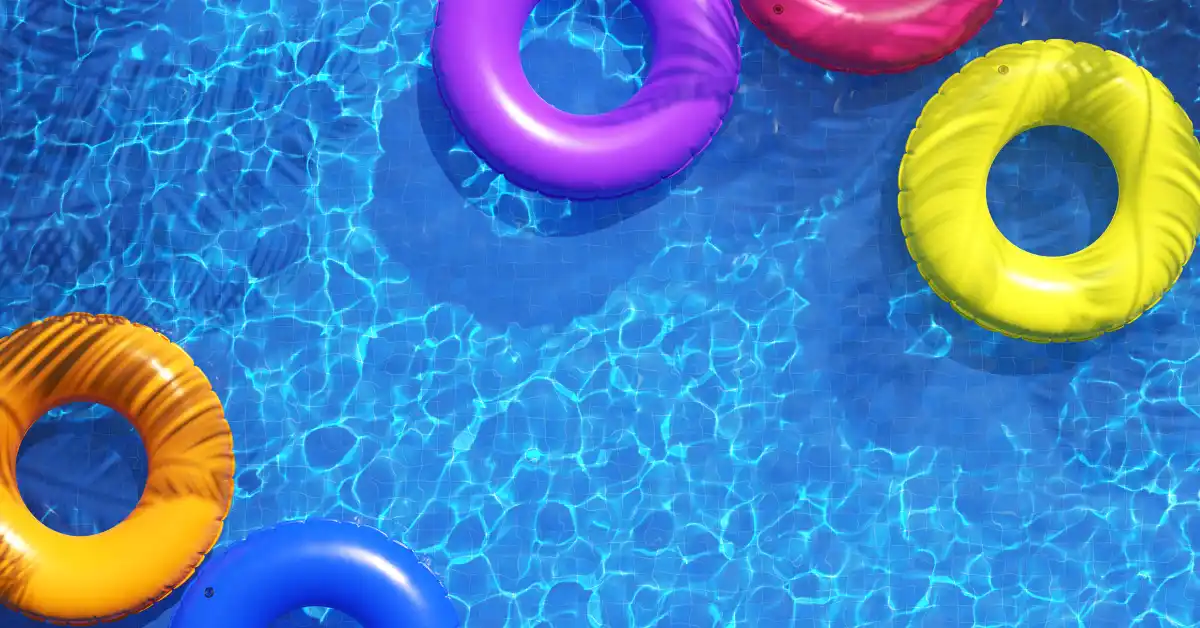Home / Swimming Pool Showdown: Vinyl vs Fiberglass Pool

How to Choose the Best Pool Size for Your Home
November 9, 2022
3 Types of Swimming Pools & How to Choose Your Perfect Pool
January 16, 2023When it comes to inground pool composition, you have thousands of choices– actually, that’s not true, you really only have three viable choices: vinyl, concrete, or fiberglass pools. So when comparing a vinyl vs fiberglass pool, which choice should you make?
Our pool installation experts have everything you need to know when comparing the advantages and disadvantages of vinyl vs fiberglass pools. Shopping for a new pool sounds like it should be a fun experience, but whenever a major new renovation is taking place for your home, there are a lot of things to consider. From affordability, the installation process, and ongoing maintenance, let’s take a closer look at vinyl vs fiberglass pools so you can decide which is the best choice for your backyard.
The Contenders: Vinyl vs Fiberglass Pools
First, let’s talk about the elephant in the room: why we were so quick to discredit concrete pools. Concrete has too many drawbacks for us to recommend this type of pool, unless you want a swim-up bar, infinity pool, or vanishing edge pool. When it comes to everyday pools for the average homeowner, vinyl and fiberglass pools are the better options. Depending on your needs, you’ll find a more attractive, cost-effective, and practical option in vinyl or fiberglass materials for your new pool.
Concrete pools also have a lengthier install time, need resurfacing and repairs every few years, don’t work well with salt, require more chemicals and maintenance, and if your skin touches the surface, it feels like you’re rubbing up against, well, concrete. Unless you have some justifiable reason to invest in a concrete pool (like commercial applications or wacky landscaping that requires peculiar geometry), our recommendation is not to.
That leaves our other two pool options: vinyl vs fiberglass.
Inground Pool Materials
Unlike concrete, both vinyl and fiberglass are non-abrasive, which makes them algae-resistant and silky smooth on the skin of the people splashing around inside.
Vinyl
Vinyl pool linings are made of a highly durable, polymer that is corrosive-free. If you opt for a vinyl pool lining, it’s important to know that vinyl tends to wrinkle over time. While a wrinkle here and there is not going to damage your pool, it is not as aesthetically pleasing as the smooth, divot-free texture that a fiberglass pool offers. Vinyl linings are also more prone to damage from debris like rocks or branches, or from dog claws (or human claws, depending on who you party with).
Fiberglass Pools
When it comes to fiberglass pool construction, they are made up of high-quality, durable materials and can include customizable features like perimeter tiles, inlaid tiles, tile mosaics, or Crystite® crystal floors and walls. The surface layer of a fiberglass pool can be color customized before it is finished with a clear gelcoat, providing that super smooth texture, while still remaining algae-resistant and slip-proof.
Who wins this head-to-head matchup? Fiberglass pools’ perfectly smooth surface and customizable features make it the winner.
Affordability of a Vinyl vs Fiberglass Pool
While the durable plastic resin used for vinyl linings is built to last, they do have an expiration date, as most vinyl liners need to be replaced every 5 to 9 years.
Fiberglass pools generally cost more upfront but require little or no long-term investment since they don’t wear out or need replacing. Vinyl pools are cheaper to install, but will likely come with a higher lifetime cost since vinyl liners need to be replaced. The best part about fiberglass pools? They are built to last a lifetime, with salt water as well as chemicals not having any negative effects on their lifespan.
When looking at the affordability and long-term durability, both vinyl pools vs fiberglass pools have advantages. However, fiberglass pools edge out the competition here due to not having to replace a liner every few years.
Vinyl vs Fiberglass Pool Installation Process
Fiberglass pools can be installed quickly– dig a big hole, plop in a pool, fill it with water, and dive in. While this is a very simplified explanation of fiberglass pool installation, it’s true that it’s quite simple for professional pool installers to complete a fiberglass pool construction. You and your family could be enjoying your new fiberglass pool in as little as 3 days from the beginning of the construction process. Vinyl pools, on the other hand, take longer to build, with most constructions ranging between a 2 to 5-week timeline from start to finish.
While vinyl pools certainly win when matched up with the 3 to 6 months timeline of the pool-who-shall-not-be-named (we are looking at you, concrete!), fiberglass pools once again defeat the competition, because who can argue with a 3-day timeline before grabbing your floaties and going for a swim?
The Verdict: Fiberglass Pools Win as the Best Type of Swimming Pool!
Both vinyl and fiberglass come with benefits and drawbacks, with the biggest considerations being customizability, durability, and upfront vs. lifetime costs. Whatever the choice, you’ll come away with a beautiful, functional, value-enhancing investment– not to mention neighbors who suddenly want to be your new best friend.
At the end of a long day of work, school, or whatever it is you do during the day, there’s no better choice for a new pool installation than a smooth surfaced, color-customizable fiberglass pool that will last you a lifetime. We won’t call it a knockout, but fiberglass pools’ benefits certainly come out on top when compared to vinyl pools.
Contact Parrot Bay Pools for Your New Fiberglass Pool Installation
Our team of fiberglass pool installation professionals has served customers who live in or around the Raleigh area for 15 years. Offering the very best quality fiberglass pool materials and designs, we are happy to help you design the outdoor pool oasis of your dreams.
Contact us by calling (919) 888-0327, filling out our contact form for a consultation, or visiting our fiberglass pool design showroom in Benson, North Carolina! While our swimming pool showroom is in Benson, we serve Holly Springs, Fayetteville, Raleigh, Cary, Clayton, Pittsboro, Fuquay-Varina, and other areas.



